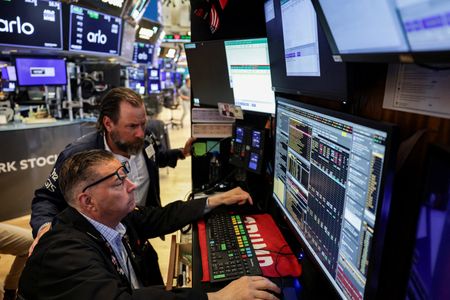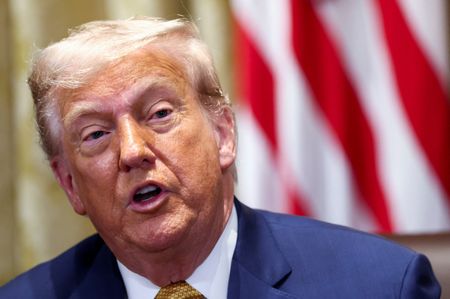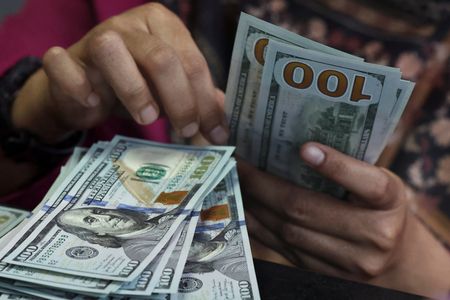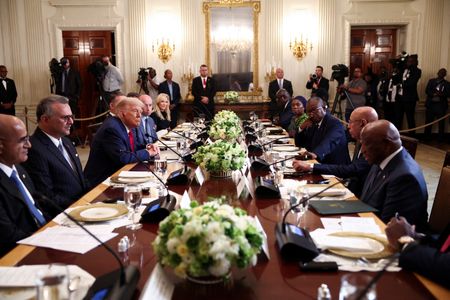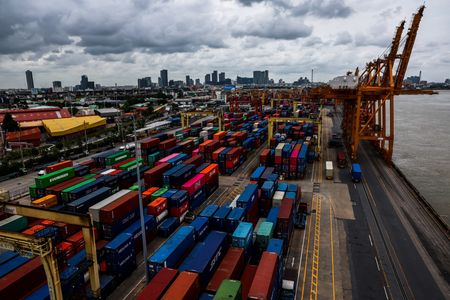By Caroline Valetkevitch
NEW YORK (Reuters) -Major stock indexes rose on Wednesday as Nvidia briefly climbed to a $4-trillion valuation, while the euro edged lower, with the Trump administration getting closer to a deal with its biggest trading partner, the European Union.
U.S. President Donald Trump issued final tariff notices to seven minor trading partners.
Bitcoin rose to an all-time high near $112,000 late on Wednesday, helped by an increase in risk appetite and persistent institutional demand.
U.S. stocks held higher after minutes from the Federal Reserve’s June 17-18 meeting showed only “a couple” of officials at the meeting said they felt interest rates could fall as soon as this month.
Most policymakers remained worried to some degree about the inflationary pressure they expect to come from Trump’s use of import taxes to reshape global trade.
Trump on Tuesday broadened his trade war, announcing he would impose a 50% tariff on imported copper. The move sent U.S. copper prices soaring and U.S. stock prices lower. He also said he would soon introduce levies of up to 200% for pharmaceuticals.
U.S. copper futures on Wednesday widened their premium to the London benchmark.
More developments are awaited in the trade war after Trump told 14 nations on Monday they will face sharply higher tariffs from a new deadline of August 1.
“Certainly President Trump and the administration have shown a willingness to change course, and what’s on the table today doesn’t necessarily mean it will be on the table tomorrow,” said Oliver Pursche, senior vice president at Wealthspire Advisors in Westport, Connecticut.
“Investors I think are ignoring that noise, and the reason they’re ignoring that noise is that the greatest fear of the tariffs was they were going to create a significant amount of inflationary pressure and economic disorder, and it hasn’t happened on a broad basis,” he said.
Supporting stocks, Nvidia shares closed up 1.8% and the company briefly eclipsed a $4-trillion market cap during the session, becoming the first public company in the world to breach that threshold, before closing the session at $3.9 trillion.
“Anytime you have something like this happening in the market, which is an historic event, it’s usually good for the general market. It shows that investors are focusing on the future. And that’s what the stock market is all about,” said Peter Cardillo, chief market economist at Spartan Capital Securities in New York.
The Dow Jones Industrial Average rose 217.54 points, or 0.49%, to 44,458.30, the S&P 500 gained 37.74 points, or 0.61%, to 6,263.26 and the Nasdaq Composite rose 192.87 points, or 0.95%, to 20,611.34.
MSCI’s gauge of stocks across the globe rose 4.99 points, or 0.54%, to 924.30. The pan-European STOXX 600 index ended up 0.78%.
The euro slipped 0.09% to $1.171 as investors weighed the likelihood that the EU would not receive a tariff letter and could secure exemptions from the U.S. baseline rate of 10%, EU sources familiar with the matter told Reuters.
Despite recent gains, the dollar index, which measures the greenback against six major peers, is still down more than 6% since Trump on April 2 announced his “Liberation Day” reciprocal tariffs.
The New Zealand dollar was last up 0.03% at $0.59 after the country’s central bank left the benchmark interest rate unchanged, as expected, noting near-term inflation risks.
U.S. Treasury yields fell after the Treasury saw strong demand for a $39 billion sale of 10-year notes, suggesting that concerns about investors stepping away from the market appear so far to be unfounded.
The yield on benchmark U.S. 10-year notes was last down 7.7 basis points on the day at 4.34%.
Oil prices were little changed, with investors weighing strong U.S. gasoline demand data and attacks on shipping in the Red Sea.
Brent crude futures rose 4 cents, or 0.06%, to settle at $70.19 a barrel. U.S. West Texas Intermediate crude gained 5 cents, or 0.07%, to settle at $68.38.
(Reporting by Caroline Valetkevitch; additional reporting by Stephen Culp in New York and Elizabeth Howcroft in Paris; editing by Joe Bavier, Mark Heinrich and Rod Nickel)

